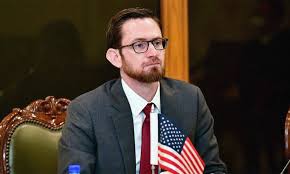The US Special Representative for Afghanistan, Ambassador Thomas West recently endorsed the importance of the UN-led Doha Conference and called on the United Nations to develop a roadmap for Afghanistan’s full integration into the international system.
According to Thomas West, the welfare of Afghans and the common interests of the global community in that country will guide this effort. He was of the view that no country wants to see a re-emergence of terrorism threat from Afghanistan. All want to see women and girls return to secondary school, university, work, and public life. While pointing out the global humanitarian aid provided to over 26 million Afghans last year, West raised concerns about the sustainability of this aid and emphasized the importance of an approach that empowers Afghans economically.
Afghanistan has been left out of the multiple global forums including the UN-hosted global Climate talks including COP 26, COP 27, and COP 28, in recent years after the Taliban took control of the country in 2021. The US-led Western bloc took a unified front against the Islamic Emirate after freezing Afghan assets in Western banks, reimposing UN sanctions against the Taliban regime along resisting diplomatic and trade ties with Taliban-ruled Afghanistan. Historically, the political boycott of the Islamic Emirate seriously hurt the Afghan people, and businesses and largely undermined the economic development and social uplift in the country.
Amid such circumstances, Pakistan has been the sole advocate of the Islamic Emirate of Afghanistan at the global level, which undertook various political and diplomatic initiatives to reduce economic, social, and political issues of the people of Afghanistan throughout the past years until the Taliban regime partnered with the Pakistani proscribed elements and Islamabad severed its ties with the Emirate.
The Frontier Post categorically mentioned on these pages multiple times in the past that severing ties with Kabul and pushing the Afghan interim rulers into diplomatic isolation would not serve the shared interests of the global community concerning Afghanistan. The global community looks at Afghanistan as free of transnational terrorists, with no terror haven, politically inclusive government, grooming civil society, and flourishing human and women rights in that country.
Presently, the US government has realized its mistake and announced a pivotal change in its Afghanistan policy. Hopefully, the Afghan rulers will also reciprocate this goodwill by embracing political inclusiveness and introducing liberal policies regarding women and girls’ status in their country. This is the beginning of a long journey that merits two-way cooperation to achieve shared goals and a common destiny.







